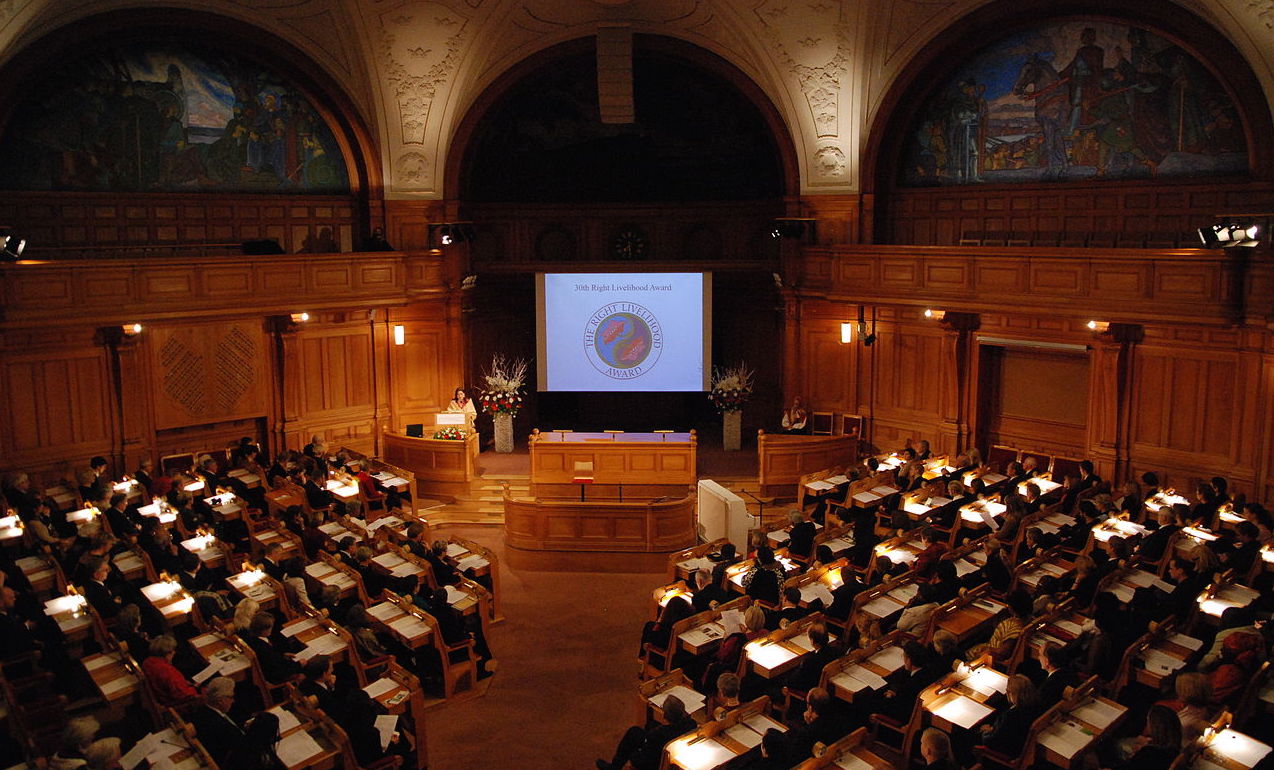STOCKHOLM — Over 1,000 people packed into the historic Cirkus Arena in downtown Stockholm Wednesday night. It wasn’t for the building’s original purpose, an actual circus, or for a rock concert, which is one of the contemporary uses of the building. What drew this remarkable cross section of Swedish society, as well as people from around the world? Activism. Courage. Passion.
Each year for the past four decades, in the short, dark days of December, people have gathered in Sweden’s capital to celebrate change-makers, whistleblowers and resistance leaders: recipients of the Right Livelihood Award. The award recognizes four individuals or organizations, to “honour and support courageous people solving global problems.”
It is no accident that the award ceremony falls at about the same time as the Nobel Prizes. The Nobels recognize lifetime achievements in medicine, chemistry, physics, literature, economics and peace. “The Nobel Foundation started a sixth Nobel Prize, in economics in 1969,” Right Livelihood Foundation executive director Ole von Uexkull explained on the Democracy Now! news hour. “My uncle, Jakob von Uexkull, began to think, if you can start new Nobel categories, it shouldn’t just be one in economics. There should be Nobel Prizes also for people who work for the environment and for the interest of the poor majority in the world.”
This year’s new Right Livelihood laureates are Aminatou Haidar of Western Sahara; Guo Jianmei of China; Davi Kopenawa and the Hutukara Yanomami Association of Brazil; and Sweden’s own Greta Thunberg.
Aminatou Haidar is an Indigenous Sahrawi woman. Western Sahara is often called Africa’s last colony, as it has been violently occupied by the Kingdom of Morocco since 1975. Haidar is one of the most prominent leaders of the nonviolent resistance to the Moroccan occupation, and has defended human rights in Western Sahara for decades. For this, Morocco imprisoned and tortured her for years.
Guo Jianmei was honoured “for her pioneering and persistent work in securing women’s rights in China,” the Right Livelihood Foundation said its announcement earlier this year. She is the first public interest lawyer working in legal aid in China, with a strong focus on women’s issues, like domestic violence and equal pay for equal work. Her legal aid law office has been shut down by the Chinese government, and she was absent from the award ceremony.
“She could not travel from China to attend the award presentation here in Stockholm,” von Uexkull told Democracy Now! “It is a sign of the shrinking space for civil society around the world. We have seen that in recent years with laureates from other countries as well. We are in constant contact with her, and we have agreed that we are not commenting on the exact reasons.”
Greta Thunberg, the 16-year-old climate activist who is actually from Stockholm, also missed the award ceremony, but for very different reasons. Greta refuses to fly in airplanes because of the vast amounts of carbon emissions they spew into the atmosphere. In September, she travelled across the Atlantic in a zero-emissions sailboat, arriving in New York City in time for the United Nations Climate Action Summit. There she admonished world leaders:
“You have stolen my dreams and my childhood with your empty words. … People are suffering. People are dying. Entire ecosystems are collapsing. We are in the beginning of a mass extinction, and all you can talk about is money and fairy tales of eternal economic growth. How dare you!”
She then crisscrossed the United States and Canada, and was heading to Santiago, Chile, to attend the United Nations climate summit, known as COP 25. When the Chilean president cancelled the COP due to mass protests against austerity and inequality, it was moved to Madrid, Spain.
Determined to make the summit, Greta then reversed course and set sail again, back to Europe, making landfall near Lisbon, Portugal, the day before the Right Livelihood award ceremony.
This year’s UN climate summit was moved not once, but twice. Before it was scheduled for Chile, it had been slated for Brazil. After right-wing extremist Jair Bolsonaro won the presidency, one of his first acts in office was to cancel Brazil’s role as host. He, like U.S. President Donald Trump, calls climate change a hoax.
The fourth and final of this year’s Right Livelihood Award recipients is a leading defender of the Amazon from Brazil, Davi Kopenawa, along with the organization he co-founded, the Hutukara Yanomami Association. Davi said on Democracy Now! [translated], “The president of the United States, they exterminated our Indigenous peoples who lived over there. [Bolsonaro] is doing just the same. He is repeating it. He wants to kill my people. He wants to get rid of the forest. He wants to destroy our health.”
Aminatou Haidar. Guo Jianmei. Greta Thunberg. Davi Kopenawa. Each truly pursues ethical living, a right livelihood. Their examples should guide us through these dark days.
Amy Goodman is the host of Democracy Now!, a daily international TV/radio news hour airing on more than 1,300 stations. She is the co-author, with Denis Moynihan, of The Silenced Majority, a New York Times bestseller. This column originally appeared on Democracy Now!



